Top 11 LLM API Providers in 2025
 Lina Lam· March 31, 2025
Lina Lam· March 31, 2025Building production-ready AI applications requires more than just good prompts—you need reliable, cost-efficient infrastructure that scales with your needs.
Selecting the right LLM API provider is critical for optimizing performance, managing costs, and ensuring your AI applications can handle real-world demands.
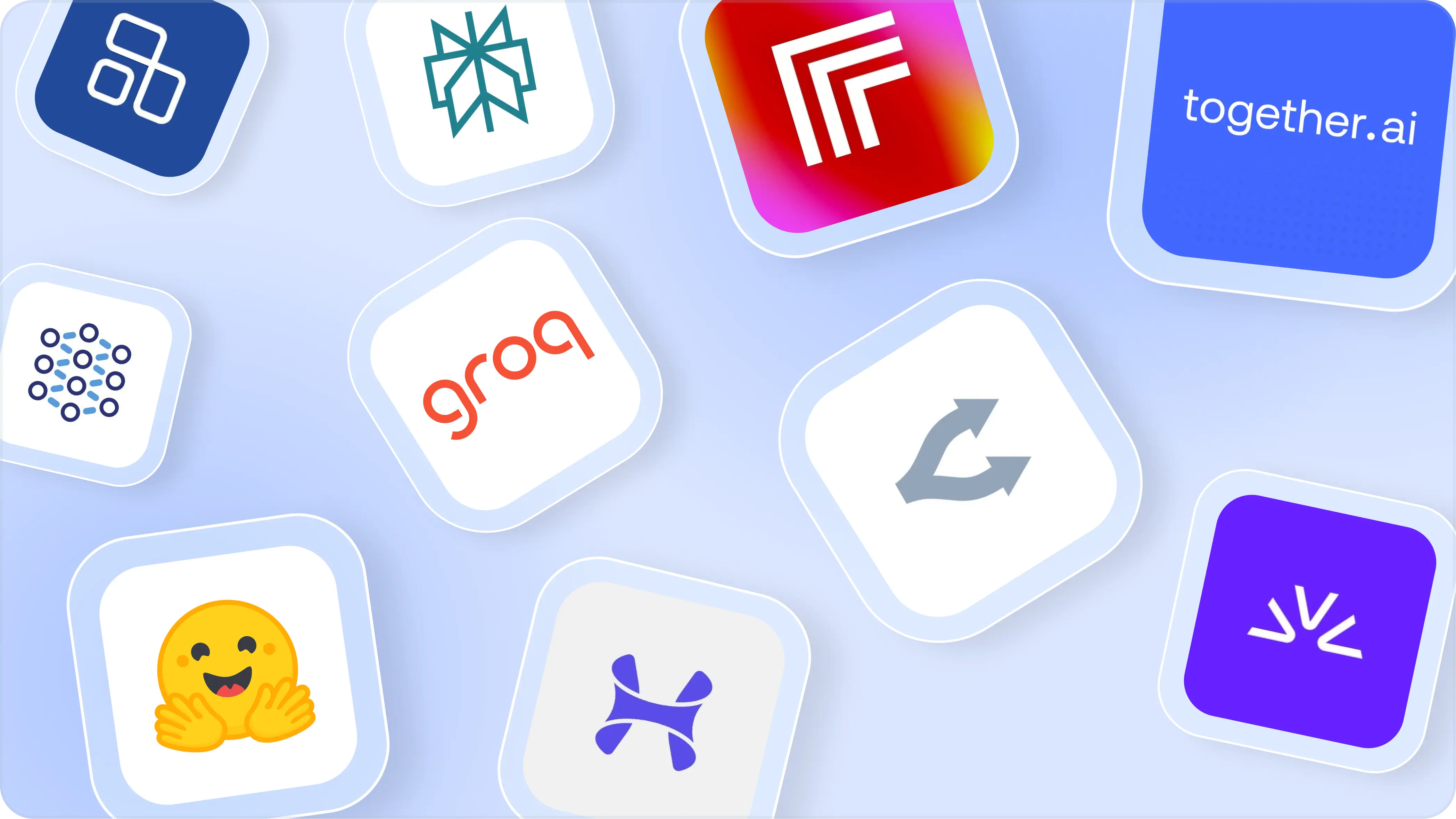
In this guide, we will compare the top AI inferencing platforms in 2025, including Together AI, Fireworks AI and Hugging Face to help you make the most informed decision on the best LLM API provider for your use case.
Comparison Across LLM Providers
To compare the performance of these leading LLM providers, we will evaluate the cost, time to first token, and context window for one of the latest models available: DeepSeek R1. Here's a summary:
| Provider | Cost per 1M tokens (input / output) | Output tokens (/second) | TTFT (seconds) | Context Window |
|---|---|---|---|---|
| Deepseek | $0.55 / $2.19 🥇 | 25/s | 4.25s | 64k |
| Together AI | $3.00 / $7.00 | 134/s 🥈 | 0.47s 🥈 | 128k |
| Fireworks (Fast) | $3.00 / $8.00 | 109/s 🥉 | 0.82s | 164k |
| OpenRouter | Varies by routing | Depends on provider | Depends on provider | Depends on provider |
| Hyperbolic | $2.00 / $2.00 🥉 | 23/s | - | 131k |
| Replicate | $3.75 / $10.00 | - | - | 64k |
| HuggingFace | Self-hosted (compute cost) | Depends on hardware | Depends on hardware | 128k |
| Groq (Distill-Llama-70B) | $0.75 / $0.99 | 275/s 🥇 | 0.14s 🥇 | 128k |
| DeepInfra | $0.55 / $2.19 🥇 | 13/s | 0.54s 🥉 | 64k |
| Perplexity (r1-1776) | $2.00 / $8.00 | - | - | 128k |
| Anyscale | Self-hosted (compute cost) | Depends on hardware | Depends on hardware | 64k–128k |
| Novita (Turbo) | $0.70 / $2.50 🥈 | 34/s | 0.76s | 64k |
Sources: Artificial Analysis, Replicate, 16x Prompt
Please note 💡
Some providers serve variants of DeepSeek R1. For example, Groq offers a distilled version (Distill-Llama-70B) optimized for speed, while Novita has a similar variant that may outperform it in cost. For consistency, this table shows the best-performing or most representative version from each provider.
1. Together AI
Best for: Large-scale model deployment with sub-100ms latency and strong privacy controls.
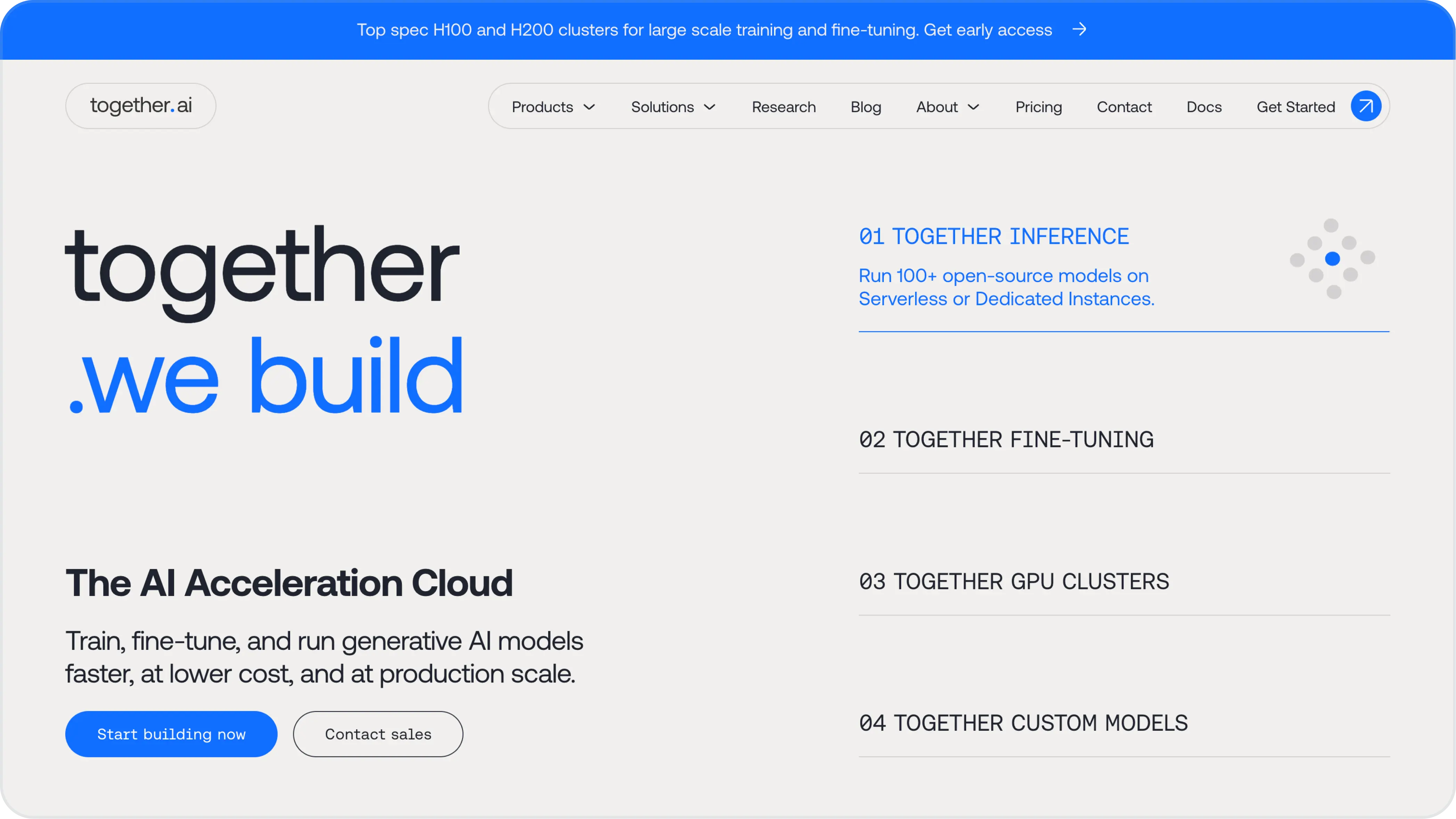
What is Together AI?
Together AI offers high-performance inference for 200+ open-source LLMs with sub-100ms latency, automated optimization, and horizontal scaling - all at a lower cost than proprietary solutions. Their infrastructure handles token caching, model quantization, and load balancing, letting developers focus on prompt engineering and application logic rather than managing infrastructure.
Why do developers choose Together AI?
Developers find Together AI useful for small fine-tuning runs. Together AI's pricing makes it up to 11x more affordable than GPT-4 (when using Llama-3), 4x faster throughput than Amazon Bedrock, and 2x faster than Azure AI.
Together offers a good selection of open-source models including Llama 3, RedPajama, and Falcon with just a few lines of Python, making it straightforward to swap between models or run parallel inference jobs without managing separate deployments or wrestling with CUDA configurations.
Together AI Pricing
- Free tier: $1 starting credit
- Pay-as-you-go: Per-token pricing varies by model:
- Llama-3-70B: $0.9/1M input tokens, $1.2/1M output tokens
- Mistral-Large: $10/1M input tokens, $10/1M output tokens
- Mixed-precision models available with optimized pricing
Adding LLM Observability to Together AI
Create an Helicone account, then change your baseurl. See docs for details.
# old endpoint
https://api.together.xyz/v1/
# switch to new endpoint with Helicone
https://together.helicone.ai/v1/
# add the following header
"Helicone-Auth": "Bearer [HELICONE_API_KEY]"
Bottom Line
Together AI is ideal for developers who want access to a wide range of open-source models. With flexible pricing and high-performance infrastructure, it's a strong choice for companies that require custom LLMs and a scalable solution that is optimized for AI workloads.
2. Fireworks AI
Best for: Speed and scalability in multi-modal AI tasks.
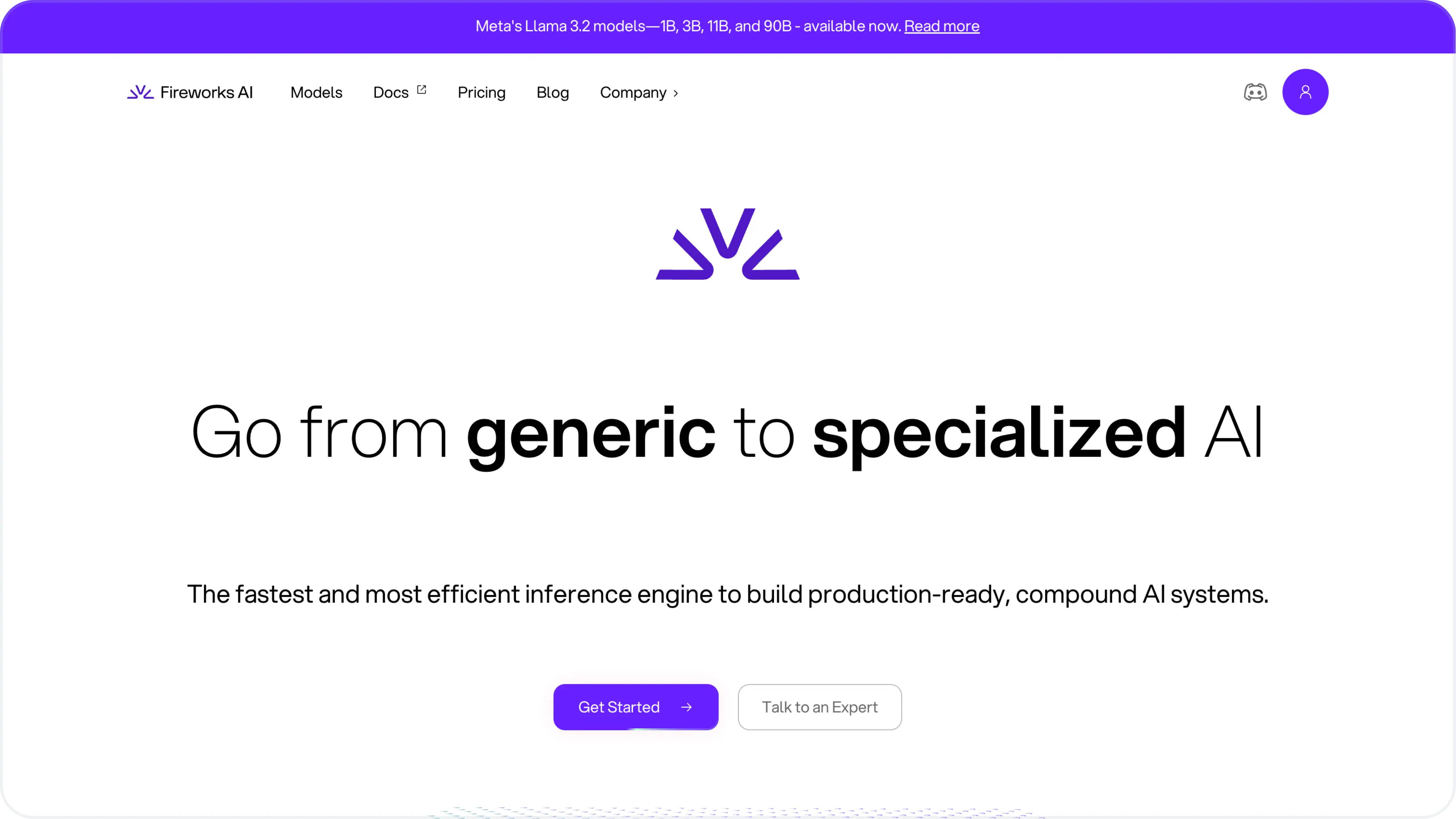
What is Fireworks AI?
Fireworks AI has one of the fastest model APIs. It uses its proprietary optimized FireAttention inference engine to power text, image, and audio inferencing, all while prioritizing data privacy with HIPAA and SOC2 compliance. It also offers on-demand deployment as well as fine-tuning text models to use either serverless or on-demand.
Why do developers choose Fireworks AI?
Fireworks makes it easy to integrate state-of-the-art multi-modal AI models like FireLLaVA-13B for applications that require both text and image processing capabilities. Fireworks AI has 4x lower latency than other popular open-source LLM engines like vLLM, and ensures data privacy and compliance requirements with HIPAA and SOC2 compliance.
Fireworks AI Pricing
All services are pay-as-you-go, with $1 in Fireworks AI free credits available for new users to test the platform.
Adding LLM Observability to Fireworks AI
Create an Helicone account, then change your baseurl. See docs for details.
# old endpoint
https://api.fireworks.ai/inference/v1/chat/completions
# switch to new endpoint with Helicone
https://fireworks.helicone.ai/inference/v1/chat/completions
# add the following header
"Helicone-Auth": "Bearer [HELICONE_API_KEY]"
Bottom Line
Fireworks is ideal for companies looking to scale their AI applications. Moreover, developers can integrate Fireworks with Helicone to get production-grade LLM infrastructure with built-in observability and real-time cost and usage monitoring.
3. OpenRouter
Best for: Routing traffic across multiple LLMs.
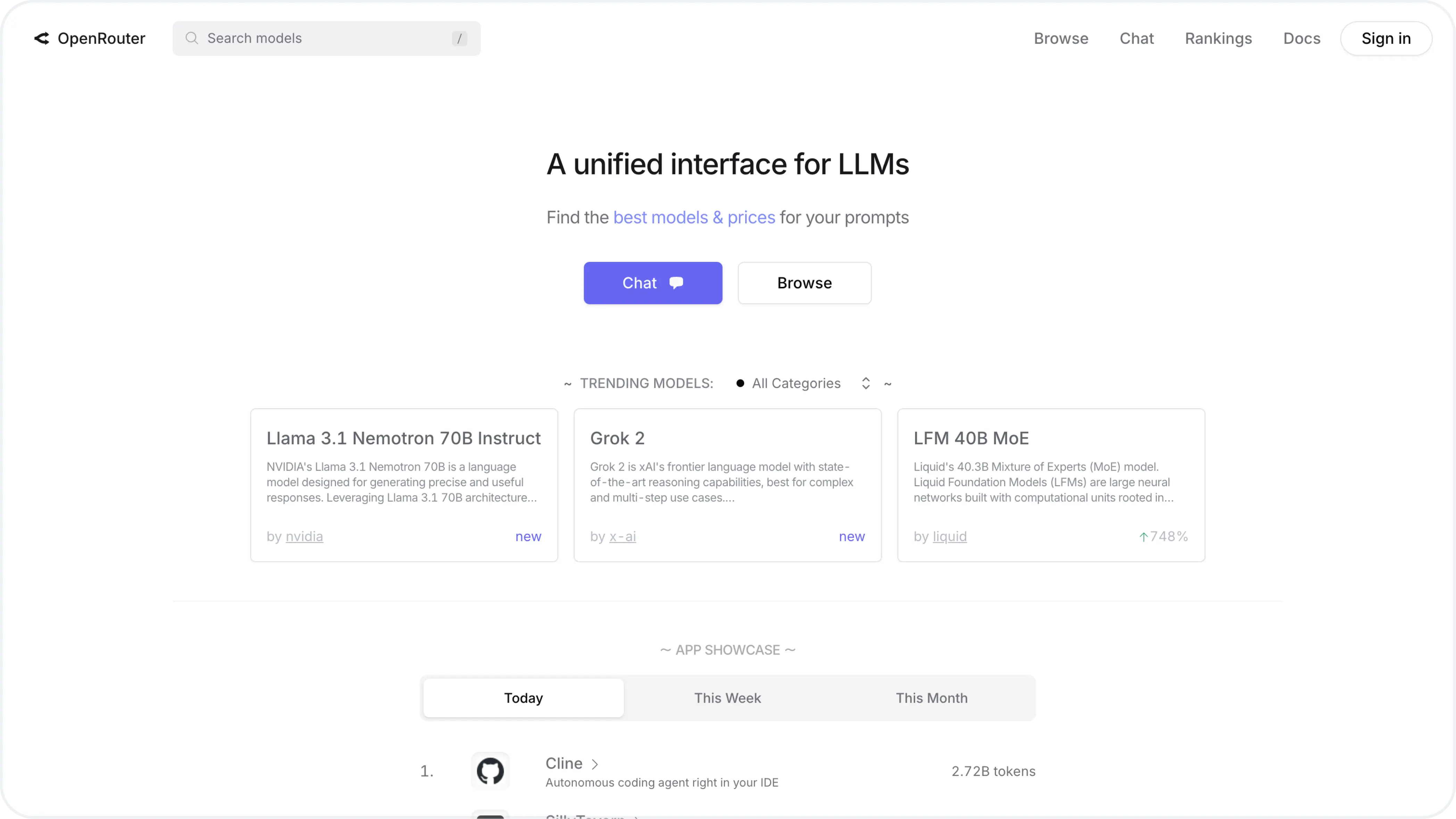
What is OpenRouter?
OpenRouter is an inference marketplace that provides access to over 300 models from all of the top providers through a unified OpenAI-compatible API. This API enables seamless integration with models from OpenAI, Anthropic, Google, Bedrock, and many others, making it a versatile LLM API platform.
Why do developers choose OpenRouter?
Developers choose OpenRouter for its ability to provide easy access to multiple AI models through a single API interface. The platform offers automatic failovers and competitive pricing while eliminating the need to integrate and manage multiple provider APIs separately.
OpenRouter Pricing
- Pay-as-you-go, with specific pricing listed for each model (some free options).
- Flexible payment options, including cryptocurrency and API-based payments.
Adding LLM Observability to OpenRouter
Create an Helicone account, then change your baseurl. See docs for details.
# old endpoint
https://openrouter.ai/api/v1/chat/completions
# switch to new endpoint with Helicone
https://openrouter.helicone.ai/api/v1/chat/completions
# add the following header
"Helicone-Auth": "Bearer [HELICONE_API_KEY]"
Bottom Line
OpenRouter is a great option for developers who want flexibility in switching between LLM providers. With a single API, you can access hundreds of AI models while getting full functionality for production deployments.
4. Hyperbolic
Best for: Developers looking for cost-effective GPU rental and API access.
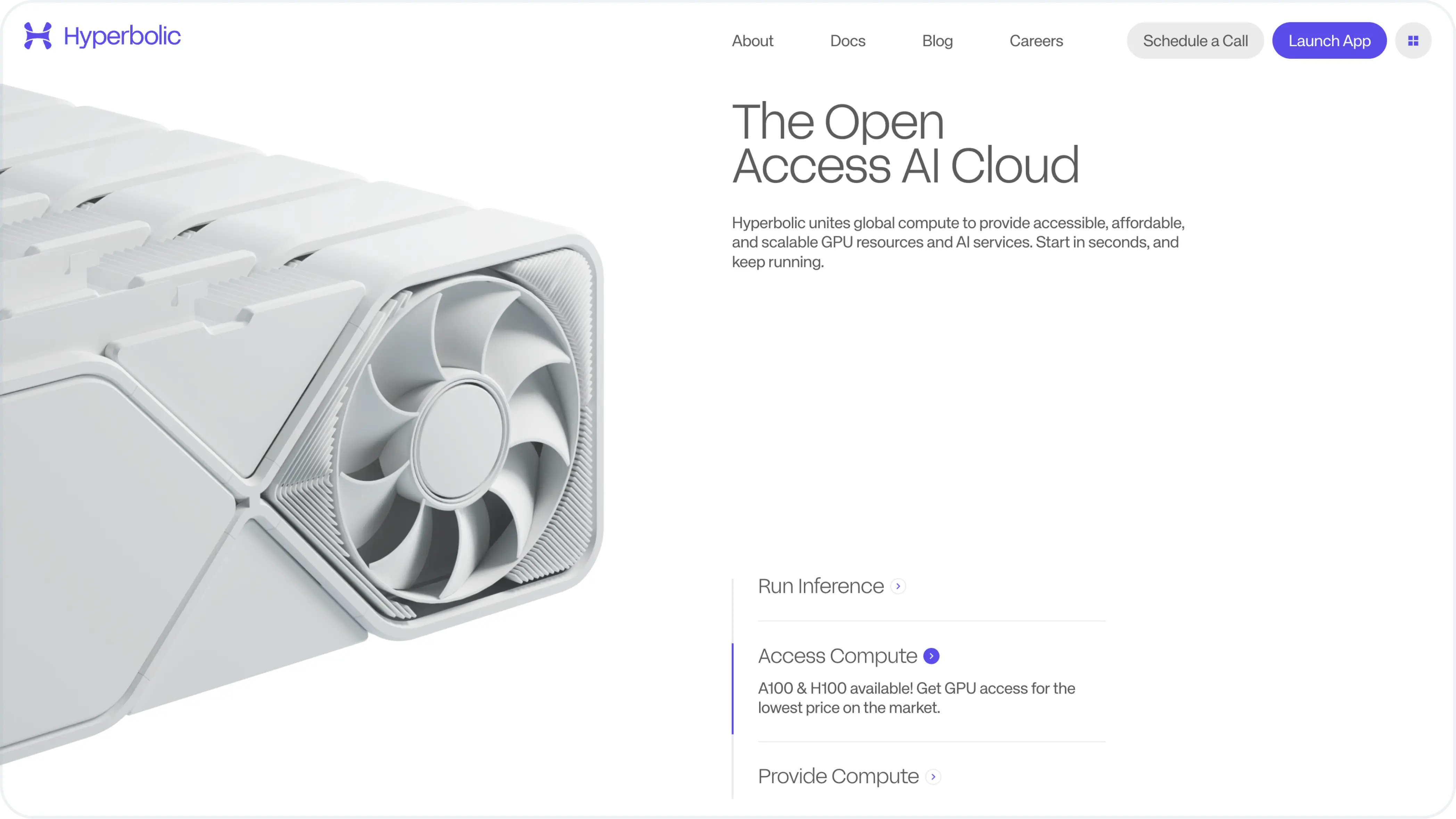
What is Hyperbolic?
Hyperbolic is a platform that provides AI inferencing service, affordable GPUs, and accessible compute for anyone who interacts with the AI system — AI researchers, developers, and startups to build AI projects at any scale.
Why do developers choose Hyperbolic?
Developers choose Hyperbolic for its competitive pricing and fast model support. Hyperbolic provides access to top-performing models for Base, Text, Image, and Audio generation at up to 80% less than the cost of traditional providers without compromising quality. They also guarantee the most competitive GPU prices compared to large cloud providers like AWS. To close the loop in the AI ecosystem, Hyperbolic partners with data centers and individuals who have idle GPUs.
Hyperbolic Pricing
The base plan is free to start, with pay as you go pricing.
Adding LLM Observability to Hyperbolic
Create an Helicone account, then change your baseurl. See docs for details.
# old endpoint
https://api.hyperbolic.xyz/v1/
# switch to new endpoint with Helicone
https://hyperbolic.helicone.ai/v1/
# add the following header
"Helicone-Auth": "Bearer [HELICONE_API_KEY]"
Bottom Line
Hyperbolic has one of the fastest times to support new models as they are released. For those looking to serve state-of-the-art models at a competitive price, Hyperbolic would be a suitable option.
5. Replicate
Best for: Rapid prototyping and experimenting with open-source or custom models.
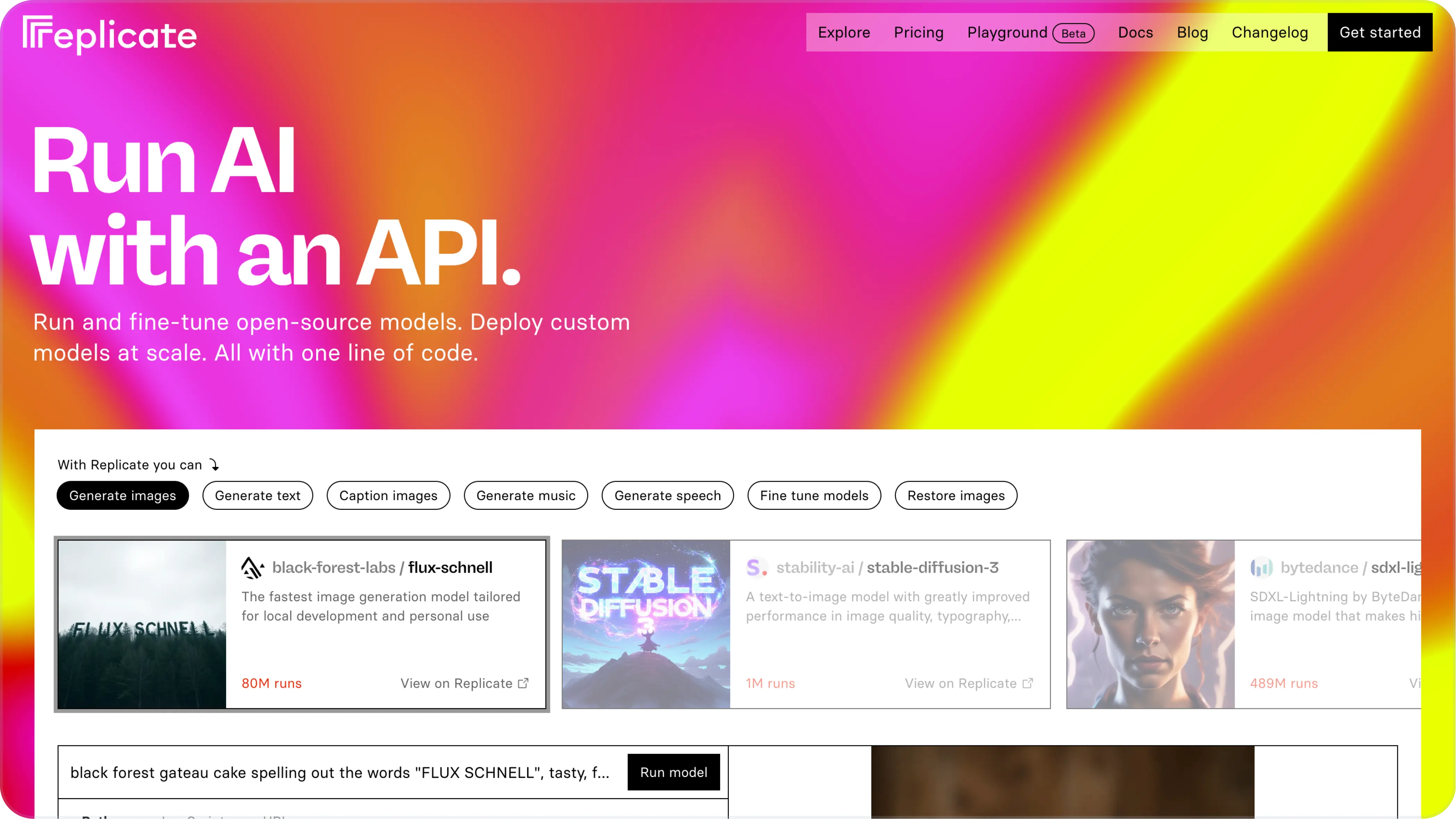
What is Replicate?
Replicate is a cloud-based platform that simplifies machine learning model deployment and scaling. Replicate uses an open-source tool called Cog to package and deploy models, and supports a diverse range of large language models like Llama 2, image generation models like Stable Diffusion, and many others.
Why do developers choose Replicate?
Replicate is great for quick experiments and building MVPs (model performance varies based on user uploads). Replicate has thousands of pre-built, open-source models covering a wide range of applications like text generation, image processing, and music generation - and getting started requires just one line of code.
Replicate Pricing
Based on usage with a pay-per-inference model.
Adding LLM Observability to Replicate
Create an Helicone account, then change your baseurl. See gateway docs for details.
# old endpoint
https://api.replicate.com/v1/predictions
# switch to new endpoint with Helicone
https://gateway.helicone.ai/v1/predictions
# then add the following headers
"Helicone-Auth": "Bearer [HELICONE_API_KEY]",
"Helicone-Target-Url": "https://api.replicate.com",
"Helicone-Target-Provider": "Replicate",
Bottom Line
Replicate scales well for small to medium volumes but may need extra infrastructure for high-volume apps. It's a great choice for experimentation and for developers who need quick access to models without the overhead.
6. HuggingFace
Best for: Getting started with Natural Language Processing (NLP) projects.
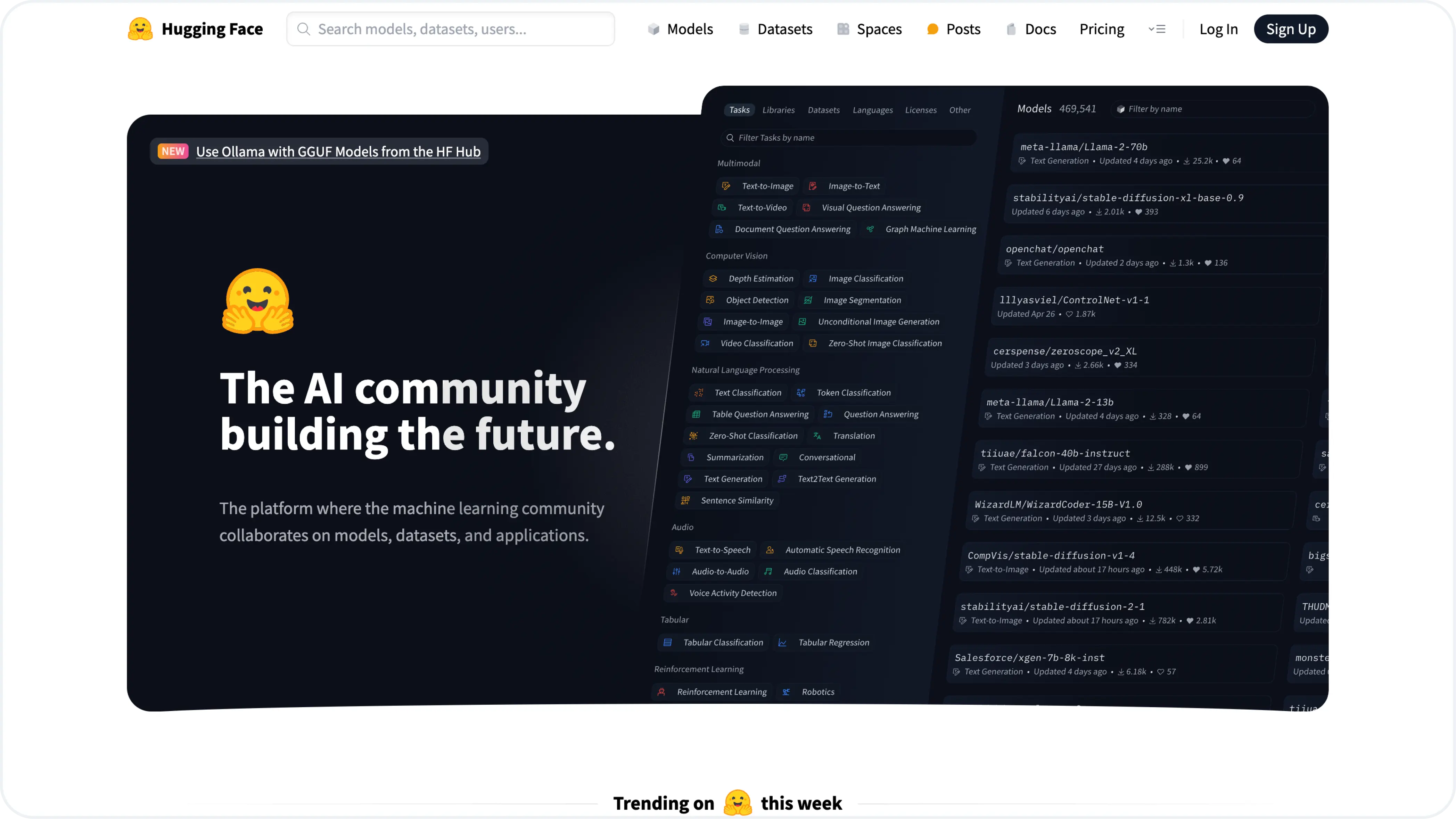
What is HuggingFace?
HuggingFace is an open-source community where developers can build, train, and share machine learning models and datasets. It's most popularly known for its transformer library. HuggingFace makes it easy to collaborate, and it's a great starting point for many NLP projects.
Why do developers choose HuggingFace?
HuggingFace has an extensive model hub with over 100,000 pre-trained models such as BERT and GPT. It also integrates with different languages and cloud platforms, providing scalable APIs that easily extend to services like AWS.
HuggingFace Pricing
Free for basic use; enterprise plans available.
Adding LLM Observability to HuggingFace
Create an Helicone account, then change your baseurl. See gateway docs for details.
# old endpoint
https://api-inference.huggingface.co/v1/
# switch to new endpoint with Helicone
https://gateway.helicone.ai/v1/
# then add the following headers
"Helicone-Auth": "Bearer [HELICONE_API_KEY]",
"Helicone-Target-Url": "https://api-inference.huggingface.co",
"Helicone-Target-Provider": "HuggingFace",
Bottom Line
HuggingFace places a strong emphasis on open-source, so you may find inconsistency in their docs or have trouble finding examples for more complicated use cases. However, HuggingFace is a great library of pre-trained models, which is useful for many NLP use cases.
7. Groq
Best for: High-performance inferencing with hardware optimization.
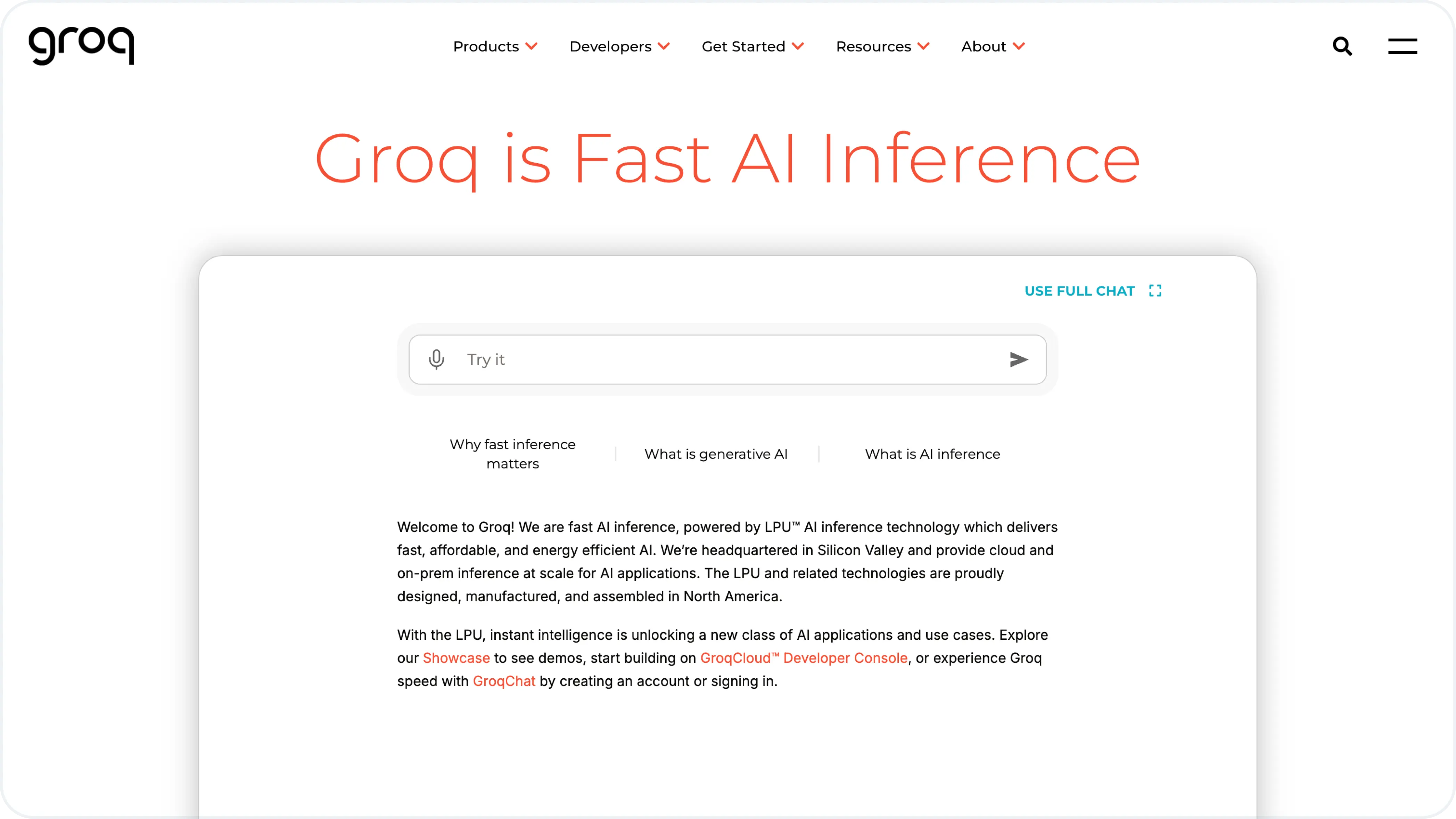
What is Groq?
Groq specializes in hardware optimized for high-speed inference. Its Language Processing Unit (LPU), a specialized chip built for ultra-fast AI inference, significantly outperforms traditional GPUs, providing up to 18x faster processing speeds for latency-critical AI applications.
Why do developers choose Groq?
Groq scales exceptionally well in performance-critical applications. In addition, Groq provides both cloud and on-premises solutions, making it a suitable option for high-performance AI applications across industries. Groq is suited for enterprises that require high-performance, on-premises solutions.
Groq Pricing
Token-based pricing, geared towards enterprise use.
Adding LLM Observability to Groq
Create an Helicone account, then change your baseurl. See docs for details.
# old endpoint
https://api.groq.com/openai/v1
# switch to new endpoint with Helicone
https://groq.helicone.ai/openai/v1
# add the following header
"Helicone-Auth": "Bearer [HELICONE_API_KEY]"
Bottom Line
If ultra-low latency and hardware-level optimization are critical for your application, using LPU can give you a significant advantage. However, you may need to adapt your existing AI workflows to leverage the LPU architecture.
8. DeepInfra
Best for: Cloud-based hosting of large-scale AI models.
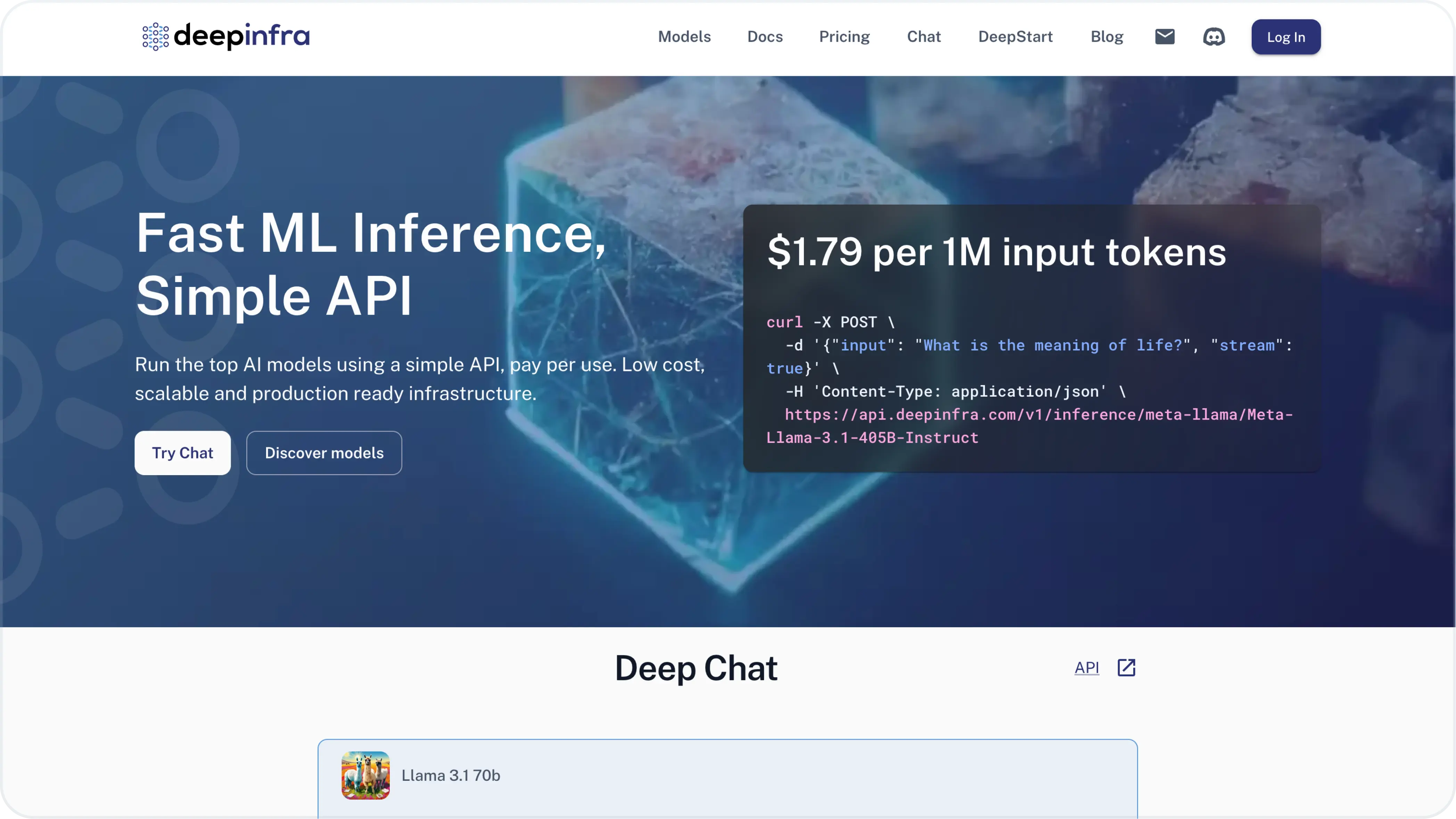
What is DeepInfra?
DeepInfra offers a robust platform for running large AI models on cloud infrastructure. It's easy to use for managing large datasets and models. Its cloud-centric approach is best for enterprises needing to host large models.
Why do developers choose DeepInfra?
DeepInfra's inference API takes care of servers, GPUs, scaling, and monitoring, and accessing the API takes just a few lines of code. It supports most OpenAI APIs to help enterprises migrate and benefit from the cost savings. You can also run a dedicated instance of your public or private LLM on DeepInfra infrastructure.
DeepInfra Pricing
Usage-based pricing, billed by token or at execution time.
Adding LLM Observability to DeepInfra
Create an Helicone account, then change your baseurl. See docs for details.
# old endpoint
https://api.deepinfra.com/v1/
# switch to new endpoint with Helicone
https://deepinfra.helicone.ai/v1/
# add the following header
"Helicone-Auth": "Bearer [HELICONE_API_KEY]"
Bottom Line
DeepInfra is a good option for projects that need to process large volumes of requests without compromising performance.
9. Perplexity AI
Best for: AI-driven search and knowledge applications.

What is Perplexity?
Perplexity AI is known for its AI-powered search and answer engine. While primarily a consumer-facing service, they offer APIs for developers to access intelligent search capabilities. pplx-api is a new service designed for fast access to various open-source language models.
Why do developers choose Perplexity?
Developers can quickly integrate state-of-the-art open-source models via the familiar REST API. Perplexity is also rapidly including new open-source models like Llama and Mistral within hours of launch.
Perplexity Pricing
Usage or subscription-based pricing. Pro users receive a recurring $5 monthly pplx-api credit. For all other users, the cost will be determined based on usage.
Adding LLM Observability to Perplexity AI
Create an Helicone account, then change your baseurl. See gateway docs for details.
# old endpoint
https://api.perplexity.ai/chat/completions
# switch to new endpoint with Helicone
https://gateway.helicone.ai/chat/completions
# then add the following headers
"Helicone-Auth": "Bearer [HELICONE_API_KEY]",
"Helicone-Target-Url": "https://api.perplexity.ai",
"Helicone-Target-Provider": "Perplexity",
Bottom Line
Perplexity AI is suitable for developers looking to incorporate advanced search and Q&A capabilities into their applications. If improving information retrieval is a crucial aspect of your project, using Perplexity can be a good move.
10. Anyscale
Best for: End-to-end AI development and deployment and applications requiring high scalability.
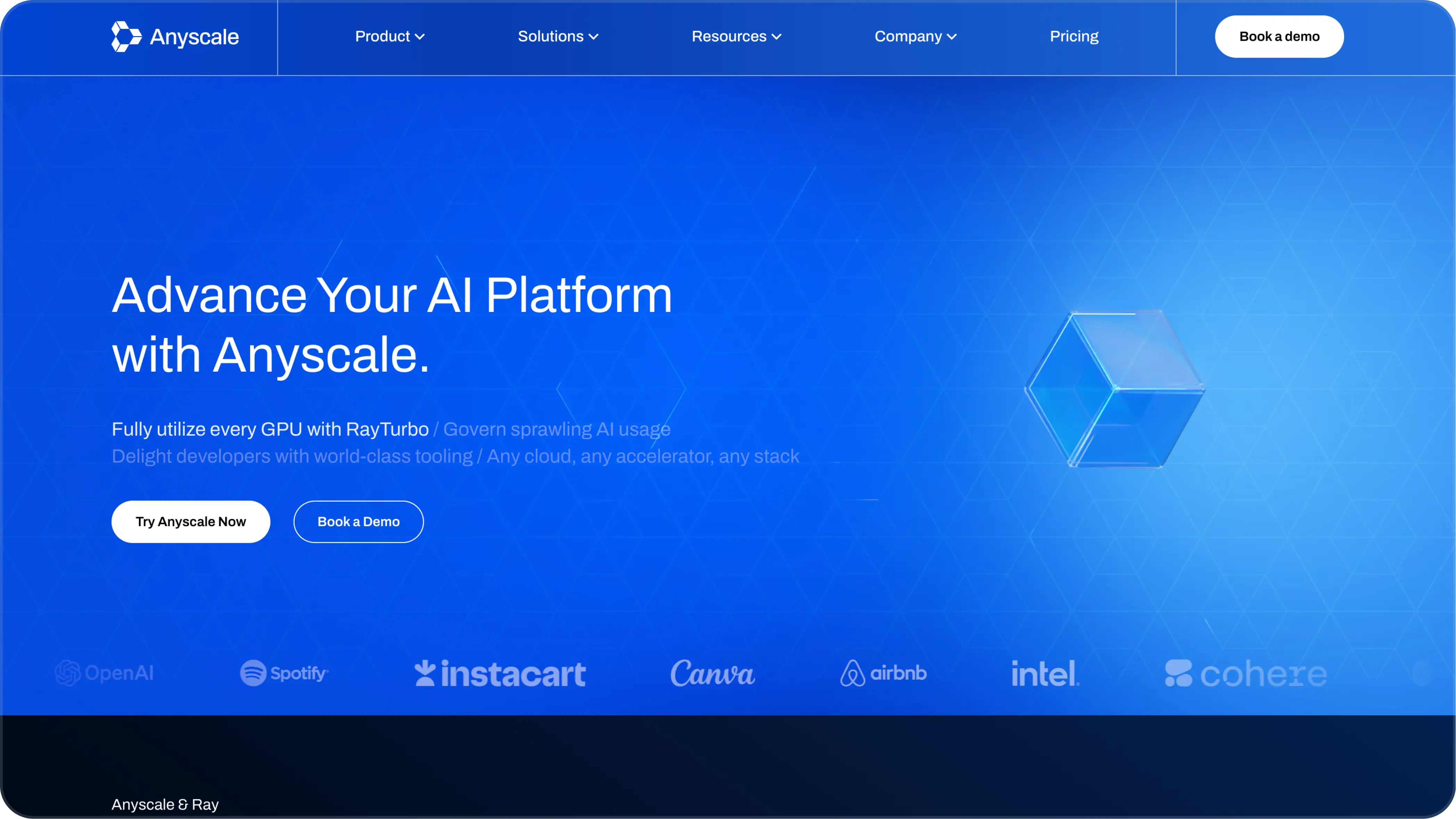
What is Anyscale?
Anyscale is a platform for scaling compute-intensive AI workloads ranging from model training to serving to batch processing. Anyscale is the company behind Ray, the open-source AI compute engine used by companies like Uber, Spotify, and Airbnb as the foundation of their AI platforms.
Why do developers choose Anyscale?
Anyscale offers governance, admin, and billing controls as well as security and privacy features suitable for enterprise-grade applications. Anyscale is also compatible with any cloud, accelerator, or stack, and has expert support from Ray, AI, and ML specialists.
Anyscale Pricing
Usage-based pricing, enterprise plans available.
Adding LLM Observability to Anyscale
Create an Helicone account, then change your baseurl. See docs for details.
# old endpoint
https://api.endpoints.anyscale.com/v1
# switch to new endpoint with Helicone
https://oai.helicone.ai/v1/
# then add the following headers
"Helicone-Auth": "Bearer [HELICONE_API_KEY]",
"Helicone-OpenAI-API-Base": "https://api.endpoints.anyscale.com/v1",
Bottom Line
Anyscale is ideal for developers building applications that require high scalability and performance. If your project uses Python and you are at the scaling stage, Anyscale can be a good option.
11. Novita AI
Best for: Low-cost, reliable AI model deployment with both serverless and dedicated GPU options.
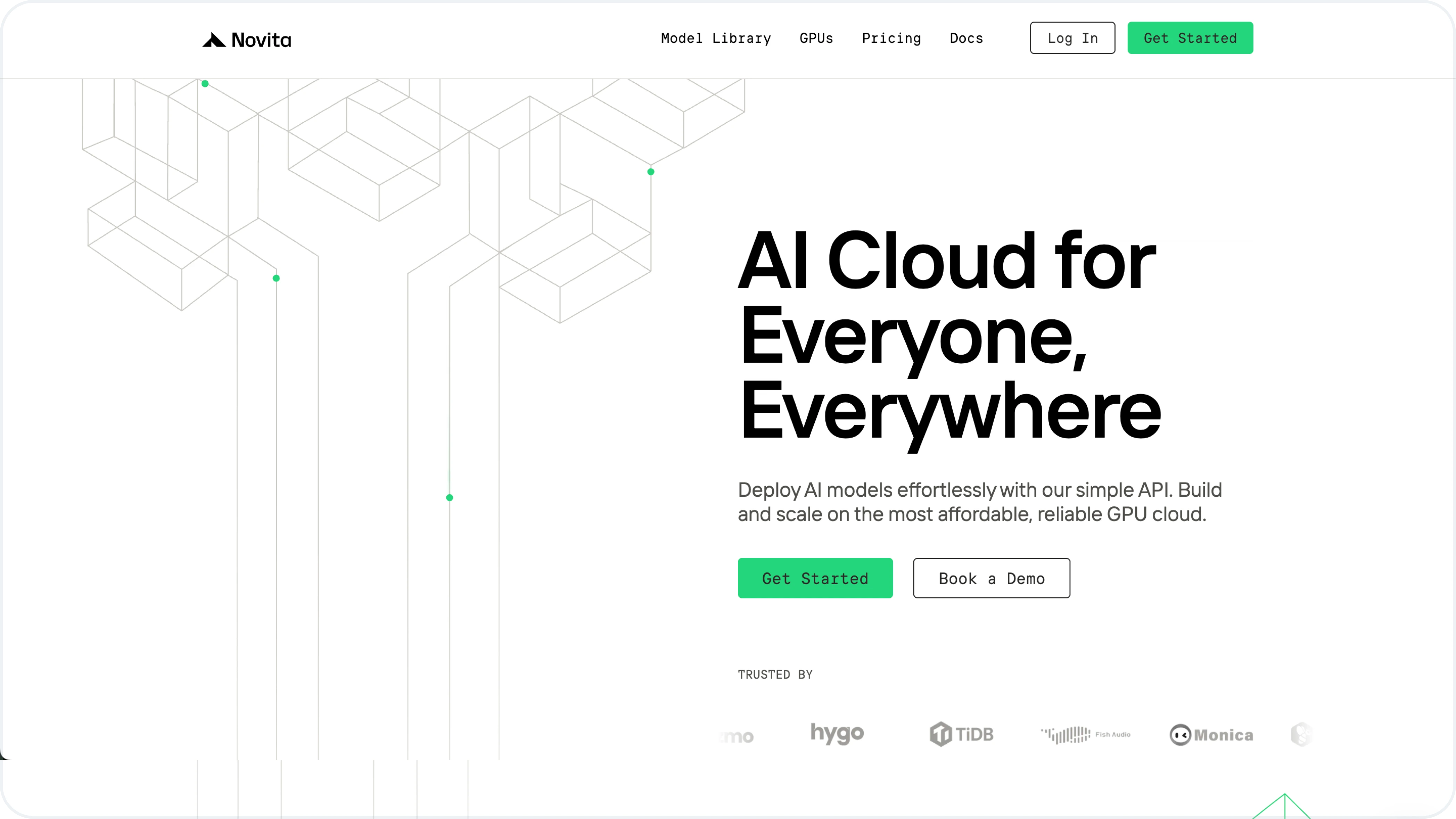
What is Novita AI?
Novita AI is a cloud infrastructure platform that provides both Model APIs for accessing 200+ AI models and dedicated GPU resources for running custom models.
As a strong alternative to Together AI, Novita's platform features both GPU Instances (dedicated VMs with full hardware control) and Serverless GPUs (fully managed, on-demand service that scales dynamically).
Why do developers choose Novita AI?
Novita AI offers up to 50% lower costs on model inference. Their globally distributed GPU network minimizes latency with deployment nodes closer to users. Novita's platform handles scaling automatically, with second-level cold-starts to manage traffic spikes efficiently, and charges only for actual usage with per-second billing precision.
Novita AI Pricing
Usage-based pricing, billed by token (for LLM APIs) or by execution time (for GPUs). Dedicated Endpoint pricing available for Enterprise.
Adding LLM Observability to Novita AI
Create an Helicone account, then change your baseurl. See docs for details.
# old endpoint
https://api.novita.ai
# switch to new endpoint with Helicone
https://novita.helicone.ai
# then add the following headers
"Authorization": "Bearer <NOVITA_API_KEY>",
Bottom Line
Novita AI offers a solid balance of affordability, performance and reliability, making it particularly well-suited for AI startups and teams needing both pre-built models and custom model deployment options.
Choosing the Right API Provider
When choosing an LLM API provider, it's essential to consider your specific requirements, whether it's affordability, speed, scalability, or certain functionality. Here's a quick guide to help you decide which LLM API provider is best suited for you:
| If You Need | Provider | Why |
|---|---|---|
| High performance and privacy | Together AI | High-quality responses, faster response time, lower cost, with a focus on privacy and scalability |
| Lowest cost solution | Hyperbolic, Novita AI | Up to 50-80% cost savings over major providers |
| Flexibility across multiple LLM providers | OpenRouter | Allows routing traffic between multiple LLM providers for optimal performance |
| Rapid prototyping and experimentation | Replicate | Simplifies machine learning model deployment and scaling, ideal for quick experiments and building MVPs |
| Multi-modal capabilities | Together AI, Fireworks AI, Replicate | Strong support for text+image models with specialized architectures |
| NLP projects and open-source models | HuggingFace | Provides an extensive library of pre-trained models and a strong open-source community |
| Large-scale AI applications | DeepInfra | Excels in hosting and managing large AI models on cloud infrastructure |
| AI-driven search and knowledge applications | Perplexity AI | Specializes in AI-powered search engines and knowledge retrieval |
| Access to latest models first | Perplexity AI, Together AI, Hyperbolic | Deploy new open-source models often within hours of release |
| Reliability & failover | OpenRouter, Together AI | Built-in redundancy and automatic routing between providers; high availability |
It's often beneficial to start with a small-scale test before committing to a provider for large-scale deployment. Many providers' free tiers offer enough tokens to test your applications before scaling.
Regardless of which provider you choose, make sure to monitor your LLM usage for cost control and performance optimization with tools like Helicone. Happy building!
You might also like
- Top Open WebUI Alternatives for Running LLMs Locally
- Helicone vs Traceloop: Best Tools for Monitoring LLMs
- Llama 3.3 just dropped — is it better than GPT-4 or Claude-Sonnet-3.5?
Monitor Your LLM API Costs ⚡️
Helicone is the top open-source observability tool for monitoring LLM applications. Track API usage and costs in real-time with Helicone.
Frequently Asked Questions
What are LLM API providers?
LLM API providers offer cloud-based platforms for accessing and utilizing Large Language Models (LLMs) through Application Programming Interfaces (APIs). They're essentially inference-as-a-service companies that allow developers to integrate AI capabilities into applications without hosting or training the models themselves.
Why should I choose an LLM API provider instead of just using OpenAI?
Using alternative LLM API providers can offer several benefits: - Lower costs, especially for high-volume usage - Access to diverse, specialized models - Easier fine-tuning and customization - Better data privacy control - Faster performance with optimized hardware - Flexibility to switch between models or providers - Support for open-source development
How do I choose the right LLM API provider for my project?
Consider factors like performance, cost, available models, scalability, ease of integration, specialized features, infrastructure reliability, data privacy, and community support. Your choice should align with your project's specific needs and budget.
Are open-source models as good as proprietary ones?
Open-source models have improved significantly and can sometimes compete with proprietary models. Providers like Together AI and Fireworks AI offer high-quality open-source models that may outperform some proprietary alternatives.
What's the most cost-effective LLM API provider?
Cost-effectiveness depends on your usage. Hyperbolic claims to reduce costs by up to 80% compared to traditional providers. However, it's best to compare pricing models across providers based on your expected usage.
Which provider offers the fastest inference?
Groq specializes in ultra-fast AI inference with their Language Processing Unit (LPU). Fireworks AI also claims to have one of the fastest model APIs, though performance may vary based on your use case.
What if I need to fine-tune models for my specific use case?
Providers like Together AI, Replicate, and Hugging Face offer fine-tuning capabilities. Check their documentation for specific instructions on model customization.
Can these LLM API providers handle multi-modal AI tasks (e.g., text and image processing)?
Yes, some providers support multi-modal AI. Fireworks AI, for example, offers FireLLaVA-13B, which can process both text and images.
What's the difference between serverless and on-demand deployment options?
Serverless options, like those from Fireworks AI, automatically scale resources based on demand. On-demand deployment gives you more control over the infrastructure but requires more management.
Are these LLM API providers suitable for enterprise-level applications?
Yes, many providers offer enterprise-grade solutions. Anyscale, DeepInfra, and Together AI provide scalable options for large-scale enterprise applications.
How do I get started with using an LLM API provider?
Most providers offer documentation and quickstart guides. Generally, you'll need to sign up, obtain an API key, and start making API calls to the models. Some providers also offer free tiers or credits for initial testing.
Questions or feedback?
Are the information out of date? Please raise an issue or contact us, we'd love to hear from you!